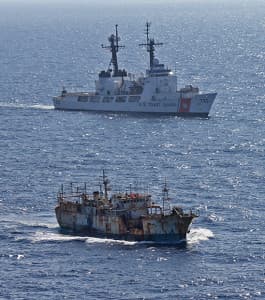More clouds gather over tuna sector as EU sanctions now threaten tariff-free hub in PNG

Source: Undercurrentnews
The European Commission’s formal warning to Papua New Guinea and the Philippines, two important players in the tuna sector, could be the prelude to a significant problem for many tuna firms.
After previously banning trade with Belize, Cambodia and Guinea, and ‘yellow-carding’ Ghana and South Korea, the EU has now warned PNG and the Philippines they risk facing trade sanctions unless they cooperate in combating illegal, unreported and unregulated (IUU) fishing.
Around a year ago PNG was celebrating sizable investment from countries including South Korea, France, China, the Philippines and Thailand, which it believed would enable it to process nearly all of its catches.
That is not an insignificant amount. PNG catches over the past six to seven years have averaged 580,000 metric tons, while the country has a total allowable catch of 720,000t, said Sylvester Pokajam, speaking at the European Tuna Conference in Brussels.
That means it accounts for 52-53% of catches in the Parties of the Nauru Agreement area, and 14% of worldwide catches.
The drive for all these foreign investments came from the ratification of an interim economic partnership agreement between the European Union and PNG parliaments, Pokajam told Undercurrent News at the time.
As a result, companies hoped to source, land, and process tuna in PNG duty free, before exporting the canned or processed products to the EU.
As of 2013 there were already plants on PNG funded by Filipino group Frabelle and by the South Seas Tuna Corporation, a joint venture between Taiwan’s FCF Fisheries Company, Jaczon of the Netherlands and Papua New Guinea interests.
Two others plants are operated by the domestic companies RD Tuna Canners and International Food Corporation, for a total capacity of 620t per day.
Meanwhile the state made agreements with Nambawan Seafoods, Niugini Tuna and Majestic Seafoods for a further three.
Awaiting decision on Ghana, South Korea
When the EU ‘yellow-carded’ Ghana and South Korea, talk turned to the possible 45 tuna vessels flying the Ghanaian flag which could face being blacklisted.
The EU is in the process of reviewing the progress of both countries in cooperating to fight IUU. If the commission is not satisfied with what it sees, the countries could face the treatment given to Belize, Guinea and Cambodia.
A blacklisting of either Korea or Ghana would have major ramifications for the tuna sector.
From January to September 2013, Ghana exported 15,744t of canned tuna to the EU, with the African country’s major market being the United Kingdom, accounting for nearly 60% of that total.
Since being warned, Ghana has taken the initiative and teamed up with the Food and Agriculture Organization of the United Nations, World Wildlife Fund, the tuna industry and the International Seafood Sustainability Foundation.
The joint project intends to use electronic monitoring systems aboard tuna purse seine vessels to verify that fishing activity is in compliance with International Commission for the Conservation of Atlantic Tuna (ICCAT) regulation.
The technology collects information to provide better estimates of the tuna catch and integrates this new technology with traditional tools used for monitoring, control and surveillance of tuna fisheries.
‘Picking on the smaller nations’
The sanctions against Guinea and Cambodia-flagged vessels were seen as having no significance for the EU or the industry, considering they would not affect any existing trade.
On the other hand the sanctions against vessels flagged to Belize could impact at least three tuna vessels owned by French canner MW Brands – owned by Thai Union– and Spain’s Pevasa.
For MW Brands it meant finding export routes for the vessels’ fish outside of the EU, and only to markets that would not re-export to the EU. In the meantime Thai Union was working to find an alternative cooperative country where it could re-register its Belize-flagged vessels.
In answer to Belize’s blacklisting, Thai Union Frozen Products said in March MW Brands would seek to reflag its Belize-flagged vessels to another country.
Statement of intent
This latest threat of sanctions against PNG and Philippines is in stark contrast to those issued in 2013, which many tuna players said would have little-to-no impact.
At the time of the sanctions against Belize, Cambodia and Guinea there was a feeling of frustration that the EU picked small and relatively insignificant countries, instead of tackling bigger countries such as South Korea.
The real deal, said sources, will be if the EU actually goes forward with its threats against South Korea and Ghana – two key players in the industry. “We would like to see if the EU dares to deal with the big boys,” an EU fishing source told Undercurrent at the time.
Another agreed. “The potential impact won’t be big. These are small countries with little diplomatic power,” he said, referring to Belize, Guinea and Cambodia. “If the EU really wanted to have had an impact, it would have gone for China, or South Korea, for instance.”
While sources consulted on this latest formal warning were not of the opinion that full sanctions would follow, there is no denying the EU is facing up to bigger players now
